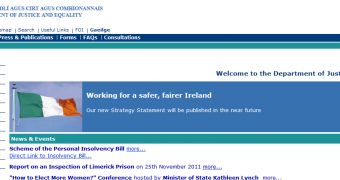A piracy law prepared by Ireland, compared by many with the US Stop Online Piracy Act (SOPA), caused a lot of concern among the country’s Internet users and Anonymous hacktivists have already begun attacking government websites as a form of protest.
According to the Irish Times, distributed denial of service (DDOS) attacks were launched at the sites of the Department of Justice and Department of Finance, both being taken offline for an hour or so.
“This is not an attempt to extract information from the website but is instead an attempt to stop access to a service. There appears to be no damage done to the website,” read a statement issued by the Department of Justice.
“The Government is aware of the potential threat of this type of cyber attack and the Department of Communications is coordinating a whole of Governement response to this threat.”
Shortly after the attacks, Anonymous Sweden took credit for the operation.
Just like its US counterpart, the Irish law S.I. No. 337/2011 — European Communities (Electronic Communications Networks and Services) (Universal Service and Users' Rights) Regulations 2011 caused a lot of controversy and a petition against it was already signed by 32,000 people.
“This legislation subverts the democratic process, favours the special interests of corporations over the rights of individual citizens, will destroy the largest growth sector in the Irish economy, and will subject the citizens of Ireland to unwarranted and unintended censorship,” the protestors write on a website specially created to stop Ireland’s SOPA.
In other parts of the world, the Anti-Counterfeiting Trade Agreement is raising a lot of controversy. A few countries already signed it and others are expected to do so.
As a result, Anonymous hackers have already made statements to reveal their intentions of launching attacks against those they consider responsible.

 14 DAY TRIAL //
14 DAY TRIAL //